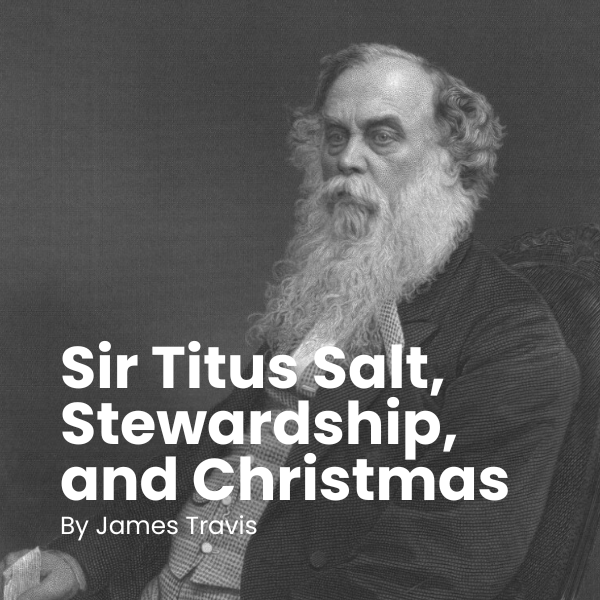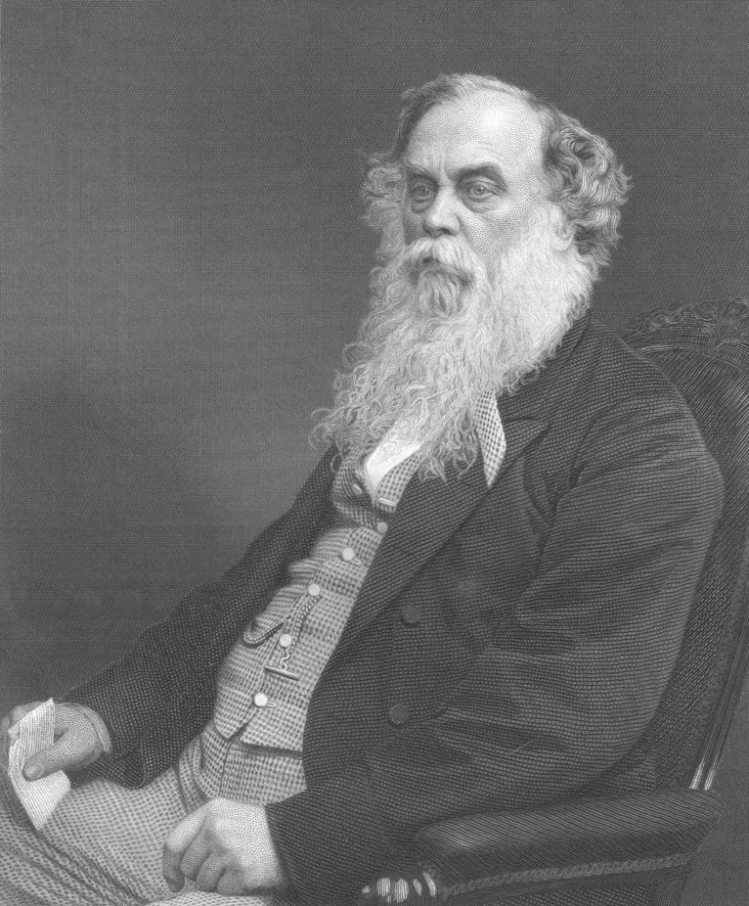
Sir Titus Salt
Sir Titus Salt was born in Morley (near Leeds, Bradford, and Wakefield in the U.K.) in 1803 and died in 1876. Educated at local grammar school, he took up work in the wool and mill industry in 1820. His father, Daniel, was a wool dealer, and Titus learned the industry over a number of years and in a number of jobs. In the early 1830’s, he struck out on his own and began to experiment with a number of different materials, namely donskoi and alpaca wools. Taking leftovers from another manufacturing process, Salt realised the potential of these new endeavours and the rest, as they say, is history.


His fortune secured, in around 1851 he began to build a large mill next to the River Aire and Leeds-Liverpool Canal in West Yorkshire and a model village for his workers to live in (named Saltaire, now a UNESCO World Heritage Site) that contained every possible amenity they could need: houses, almshouses, shops, schools, an infirmary, a club and institute, baths and washhouses, a park, and a church.




In his most thorough biography, it is written of Salt that …
“One of the most celebrated traits of Sir Titus Salt was his philanthropy.”
(Barlo and Shaw)
Giving away around £139,000 in gifts, donations, and through other philanthropic projects — equivalent to over £12,000,000 today — Salt was also known for sparing no expense to ensure his workers’ safety and general quality of life. His mill was built to minimise potential accidents (dangerous parts being routed through the floor, for example) and designed to ensure that workers’ health would not suffer untowardly whilst at work (heating and ventilation installed to keep the ambient temperature comfortable). Above and beyond the place of work, it is recorded that Salt paid personally for his model village to have gas lighting and heating. He saw his great wealth as a great responsibility to help a great number of people. He brought, as one author writes, a social conscience to industrial business practices at a time when many did not, and when many factory and mill workers lived in abject poverty.
Why did Salt behave this way?
Was he just a thoroughly nice person?
Did he not have any particular passions of his own on which to spend his fortune?
Stewardship
Much writing about his life suggests it was down to his Christian faith. Dr. Simon Ross Valentine records that Salt’s personal motto was “Quid non Deo juvante” (What can a man not do with God’s help?) and that religion was, without doubt, a driving and motivating force in his life. His view of stewardship is particularly relevant to his generous and consistent giving. The privilege of resource was seen as a tremendous responsibility by Salt and some of his contemporaries, and his vast resources, coupled with his Christian principles and views on stewardship, resulted in a genuine desire and decision to help others.
Stewardship is actually rooted in creation itself (Genesis 1.26-28) and as humans, we have a profoundly privileged position in which we use what God has made and entrusted to us (Psalm 24.1). This applies, as above, to the big picture things that we all contribute to the stewardship of, but also to what God has given each of us (Matthew 25.14-30). Sir Titus Salt saw his great wealth and abilities as things not to be hoarded and kept for his own enjoyment and pleasure, but resources and tools to be used to improve the lives of many.
At its core, Christian stewardship declares that we do not truly own anything and God owns everything. We are temporary stewards of that which God has created and graciously given us. Long before Salt’s time, as R.C. Sproul wrote,
“A steward in the ancient world was a person who was given the responsibility and authority to rule over the affairs of the household. For example, the patriarch Joseph became a steward over Potiphar’s household: he managed everything in the household and was given the authority to rule over the house (Gen. 39:1–6). In that role, he was responsible to manage the household well; he was not to waste the resources of the family but to make wise decisions.”
Christmas
As we approach Christmas, the time when we pause and ponder the first advent of our Lord Jesus, we can draw a parallel between the resources, riches, abilities, and attributes He had and did not consider keeping to Himself (cf. Philippians 2) and the example of Sir Titus Salt. We can also take a supremely practical and personally applicable point from the life and stewardship of Sir Titus Salt: improving the lives of those around us can take many forms.
Perhaps it is in the time honoured way of giving a gift to show you know and love someone. Giving them what they want the most communicates very clearly that you know them and love them in a way that wants to bring joy into their life.
Perhaps, like Sir Titus, it is using your resources to tangibly improve someone’s situation. Giving them what they need the most communicates very clearly that you see them for who and where they are and care enough to meet their needs, and, possibly, remove them.
Or, maybe, this year for you it is following in the example of Jesus and, counting others as more important than yourself, cashing in some of your status and privilege to make someone else’s life better. This can take so many forms. Being present, affirming, loving, supporting, going, coming back, doing, forgiving, showing, saying …
However we choose to navigate the upcoming season in relation to those around us, it is certainly a time of year when our stewardship is, perhaps, most publicly seen. Where we choose to invest our time, talents, and treasure at Christmas is, I think, a wonderful statement of how we see the season and its reason. Is it about getting or giving, hoarding or helping?
As we move into the festive period this year, then, consider the words of the master to the servant who displayed some strong stewardship in the parable of the talents:
“Well done, good and faithful servant. You have been faithful over a little; I will set you over much. Enter into the joy of your master.”
(Matthew 25.23)
Further reading
Robert Balgarnie, Barlo and David Shaw (2003). Balgarnie’s Salt with commentary and additions by Barlo and Shaw. Saltaire: Nemine Juvante.
S.R. Valentine (2021). Sir Titus Salt: The Founder of Saltaire and its Mills. Bradford: Themelios Publishing House.
https://www.wordonthestreets.net/Articles/464272/Sir_Titus_Salt.aspx







